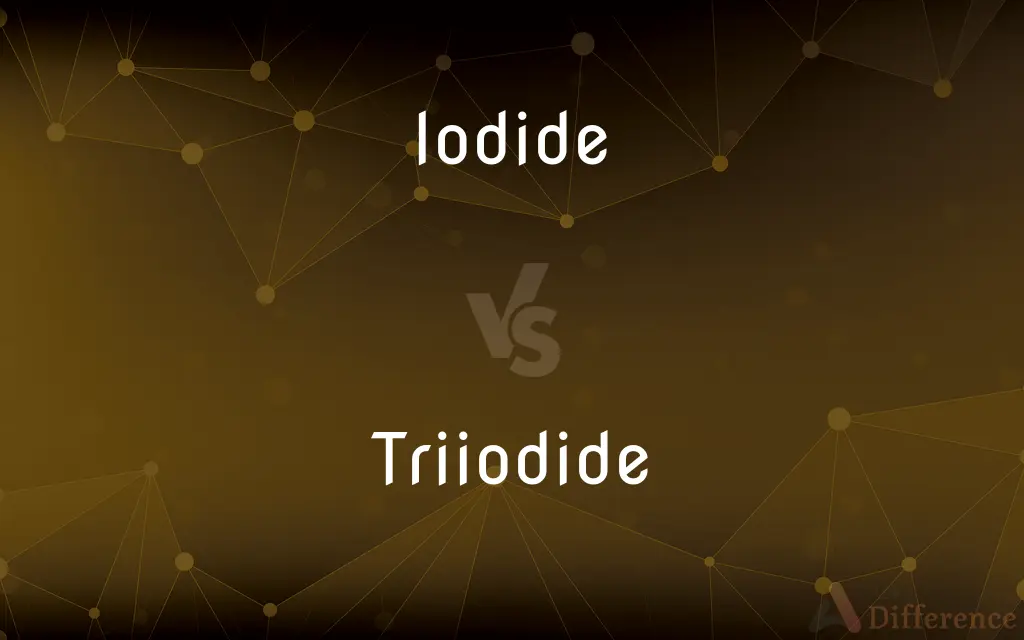Iodide vs. Triiodide — What's the Difference?
By Tayyaba Rehman — Published on January 15, 2024
Iodide is a negatively charged ion of iodine (I⁻), typically formed when iodine gains an electron. Triiodide is a complex ion composed of three iodine atoms (I₃⁻), usually formed from the combination of one iodide ion and one diatomic iodine molecule.

Difference Between Iodide and Triiodide
Table of Contents
ADVERTISEMENT
Key Differences
Iodide, represented as I⁻, is a simple anion formed by iodine gaining an electron, usually during a reaction with a more electropositive element. Triiodide, denoted as I₃⁻, is a polyatomic ion formed when an iodide ion combines with a diatomic iodine molecule (I₂), resulting in a three-atom complex.
Iodide ions are commonly found in salt form, such as potassium iodide (KI), and are used in nutritional supplements and medical applications. Triiodide, due to its larger and more complex structure, is typically observed in chemical reactions and tests, such as the iodine-starch test for the presence of starch.
In terms of stability, iodide ions are generally more stable and can exist independently in various compounds. Triiodide ions are less stable and often form only under specific conditions, such as in the presence of excess iodine.
The chemical behavior of iodide is characterized by its ability to act as a reducing agent, while triiodide's chemical properties are influenced by the interaction between the iodide ion and molecular iodine within the complex.
Iodide is essential in human biology, being a key component of thyroid hormones. Triiodide, due to its reactive nature, does not have a direct biological role but is used in analytical chemistry for detecting certain substances.
ADVERTISEMENT
Comparison Chart
Composition
Single iodine atom with an extra electron.
Complex of three iodine atoms.
Common Forms
Found in salts like potassium iodide.
Formed in reactions, not typically isolated.
Stability
Relatively stable as an independent ion.
Less stable, often transient in reactions.
Chemical Behavior
Acts as a reducing agent.
Properties depend on I₂ and I⁻ interaction.
Biological Role
Essential for thyroid function in humans.
No direct biological role; used in chemistry.
Compare with Definitions
Iodide
It often forms salts with metals and is used in medical treatments.
Sodium iodide is used in radiopharmaceuticals.
Triiodide
Triiodide is a polyatomic ion formed from an iodide ion and molecular iodine.
Triiodide is formed in the reaction between iodide and elemental iodine.
Iodide
Iodide is essential for thyroid hormone synthesis in the human body.
Iodide deficiency can lead to thyroid disorders.
Triiodide
Triiodide is less stable and more reactive than simple iodide ions.
Triiodide decomposed quickly under the experimental conditions.
Iodide
Iodide is the ion form of iodine, characterized by an extra electron.
Potassium iodide is commonly used to provide dietary iodine.
Triiodide
Triiodide is not commonly found in biological systems.
Unlike iodide, triiodide doesn't have a direct function in human physiology.
Iodide
In chemistry, iodide can act as a mild reducing agent.
Iodide reacted with the oxidizing agent to reduce it.
Triiodide
It is often used in analytical tests, like the iodine-starch test.
The presence of starch turned the triiodide solution blue-black.
Iodide
Iodide ions are commonly used in analytical chemistry.
Iodide was used to determine the concentration of copper in the sample.
Triiodide
The formation of triiodide demonstrates halogen bonding phenomena.
Studying triiodide helps understand halogen bonding in larger complexes.
Iodide
Univalent anionic iodine, or a compound of iodine, especially a binary compound of iodine with a more electropositive element.
Triiodide
(chemistry) Any compound containing a I3- moiety consisting of three iodine atoms in a more or less linear configuration.
Iodide
(inorganic chemistry) A binary compound of iodine and another element or radical.
Triiodide
(chemistry) Any iodide of a trivalent element that contains three I- ions.
Iodide
A binary compound of iodine, or one which may be regarded as binary, in which iodine has a valence of -1; as, potassium iodide.
Iodide
A salt or ester of hydriodic acid
Common Curiosities
Is iodide naturally occurring in the human body?
Yes, iodide is essential for thyroid function and occurs naturally in the body.
Can triiodide be used in medical applications?
No, triiodide is primarily used in analytical chemistry, not in medicine.
Is iodide safe for consumption?
Yes, iodide is safe in regulated amounts, often found in iodized salt.
Are iodide supplements necessary for health?
They can be necessary in areas where dietary iodine is insufficient.
How is triiodide formed in a lab setting?
Triiodide is formed by mixing an iodide salt with elemental iodine.
Is triiodide a stable compound?
Triiodide is less stable and more reactive compared to iodide.
How does iodide benefit the thyroid gland?
Iodide is used by the thyroid gland to produce essential hormones.
What is the significance of triiodide in the iodine-starch test?
Triiodide reacts with starch to produce a characteristic blue-black color.
How does iodide impact the environment?
Iodide is a naturally occurring element and generally not harmful in the environment.
Can iodide ions exist independently in nature?
Yes, iodide ions can be found in nature, especially in seawater.
Can triiodide be used in food preservation?
No, triiodide is not used in food preservation.
Can triiodide be found in the human diet?
No, triiodide is not typically found in the human diet.
Is iodide used in water purification?
Yes, iodide can be used in some water purification processes.
Are iodide and triiodide interchangeable in chemical reactions?
No, they have different chemical properties and are not interchangeable.
Are there health risks associated with triiodide?
Triiodide is not typically encountered in a way that poses health risks.
Share Your Discovery

Previous Comparison
HRM vs. IHRM
Next Comparison
Photoelectric Effect vs. Compton EffectAuthor Spotlight
Written by
Tayyaba RehmanTayyaba Rehman is a distinguished writer, currently serving as a primary contributor to askdifference.com. As a researcher in semantics and etymology, Tayyaba's passion for the complexity of languages and their distinctions has found a perfect home on the platform. Tayyaba delves into the intricacies of language, distinguishing between commonly confused words and phrases, thereby providing clarity for readers worldwide.














































